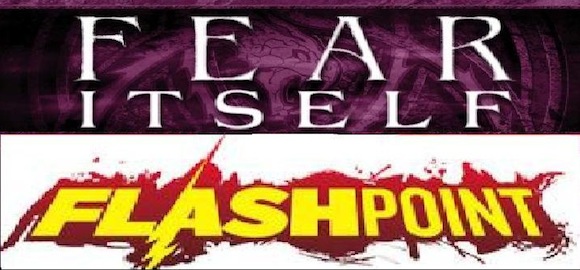Everything You Need to Know About Fear Itself and Flashpoint …So Far
If you liked it then you should have put a Lantern Ring on it

The summer is halfway over, and Marvel and D.C.’s annual crossover events are well underway. Both companies boast their usual claims that following their event, things will be changed irrevocably in their respective universes. Previous “Crises” and “Secret Wars” have proven otherwise, with continuities returning more or less to the status quo in the months following the end of the big event. Flamboyant, flashy (no pun intended) covers once again adorn seemingly necessary companion titles to the earth-shattering summer series that seek to empty our wallets and purses. Thus, the annual debacle arises over whether our hard earned money should be spent on these events, when they demand their own importance, but more often than not result in general frivolity. Although it is not my place to tell you what to buy or not to buy, I can at least inform you of the nature of each event, and fill you in on what’s been going on; so that if you find yourself browsing your local comic book store this week, you will be well informed.
Flashpoint deals with the ramifications of Professor Zoom, The Reverse Flash’s, changes in history, and the efforts of The Flash, Kid Flash, and Booster Gold to revert the timeline to the normal D.C. continuity. Barry, Bart, and Booster are the only regular D.C. characters directly affected, and therefore are the only characters whose books deal with the events of Flashpoint. This works well, because it allows the other titles to continue with their current story lines unperturbed (granted they will still be rebooted in a couple months), and we are left with what is essentially a large scale Elseworlds tale. In this alternate reality, the world is torn apart by a war between Amazons and Atlanteans, led by Wonder Woman and Aquaman respectively. Cyborg, America’s greatest hero, is charged by the president with the task of putting together a team to stop this catastrophe, lest America turn to other means of ending the war. Although we know that Flashpoint as a whole will “reboot” or reinterpret the D.C. Universe in the upcoming months, the specific events that occur in this alternate world are essentially inconsequential. However, this doesn’t mean that it’s not a great ride. Reading about Deathstroke as a pirate, Captain Cold as a “hero,” and Oliver Queen as a billionaire weapons manufacturer, is incredibly entertaining. Like Age of Apocalypse and other alternate reality stories, Flashpoint appeals to the audience with the fun and novelty of considering what their favorite characters would be like given a different history.
Contrasting Flashpoint, Fear Itself is weaved throughout the 616 Marvel universe, with everyone from Deadpool to the Thunderbolts having a tie-in of some sort. The main plot revolves around the Red Skull’s recently disfigured daughter, Sin. In a plan to surpass her father’s legacy, Sin obtains a hammer of power that the Red Skull was never able to use, and unlocks the power of the Norse god Skadi. Skadi herald’s the return of the Serpent, Odin’s long lost brother and nemesis. Sin and Skadi, now fused as one being, summon several hammers of power to earth which posses those who are deemed worthy, and turn them into instruments of chaos for the Serpent. Fearful that the Serpent might destroy the Universe, Odin makes plans to destroy the earth, in hopes of cutting off a limb to save the whole tree. In addition to having to stop the plans of both the Serpent, and Odin; our heroes have to defeat the rampage of destruction caused by “the worthy,” as well as Sin’s army of Nazis in giant mecha suits, who appeared out of nowhere with no explanation given.
The focus of the series was intended to be the sense of fear and panic instilled in the public during a time of uncertainty and disillusionment. This was meant to parallel and touch on today’s culture, in an attempt to provide a poignant story that examines our modern world while simultaneously telling a compelling story, much in the way that Civil War did. However, with a greater focus on showcasing Marvel’s summer blockbuster stars, Thor and Captain America, Fear Itself rarely delivers on the social commentary, and for the most part is reduced to an event chocked full of action with some great scenes in certain books. Ultimately, Fear Itself is a sloppily rushed event that tries to force us to care; but when it succeeds in truly making us feel, it hits home hard.
CAUTION: MASSIVE AMOUNT OF SPOILERS AHEAD
Pages: 1 2
Have a tip we should know? tips@themarysue.com